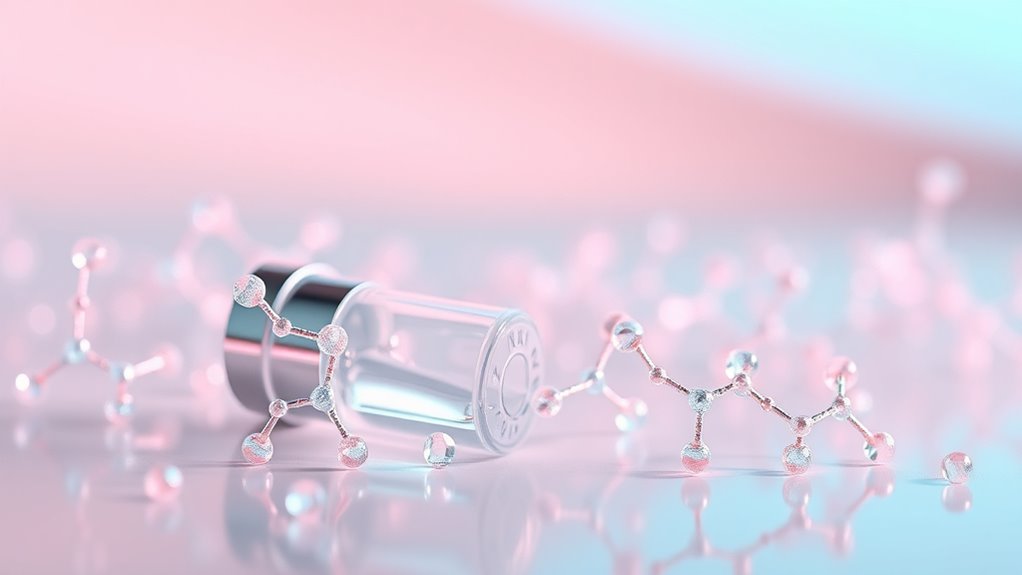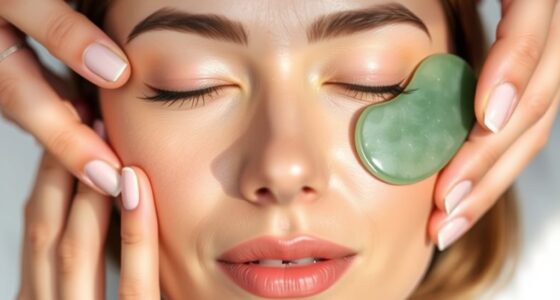Peptides in serums act as messaging molecules that signal your skin to repair and regenerate. They penetrate the skin surface using delivery systems like liposomes and are stabilized to prevent breakdown. This guarantees they stay active longer, effectively activating skin cells to boost collagen production and improve elasticity. When formulated properly, peptides can provide visible anti-aging benefits. Want to discover how these powerful signals work and how to choose the best formulations? Keep exploring for more insights.
Key Takeaways
- Peptides in serums act as signaling molecules that stimulate skin cells to produce collagen and elastin.
- Small peptides penetrate the skin more effectively, activating repair pathways deeper within skin layers.
- Stable peptides maintain their signaling ability, ensuring consistent activation of skin repair processes.
- Delivery systems like liposomes enhance peptide absorption, increasing their effectiveness in signaling skin regeneration.
- Proper formulation balances peptide stability and absorption, leading to visible improvements in skin firmness and reduced aging signs.

Have you ever wondered how skincare products can effectively target signs of aging? The secret lies in how well their ingredients, especially peptides, penetrate your skin and stay effective long enough to do their job. When it comes to serums infused with peptides, understanding skin absorption is key. Your skin acts as a barrier, making it challenging for certain molecules to reach the deeper layers where they can stimulate repair. That’s why formulators focus on optimizing delivery systems to enhance absorption. They often use smaller peptide molecules or pair them with carriers like liposomes, which help the peptides slip past the skin’s surface more easily.
Optimized delivery systems help peptides penetrate deeper and boost skincare effectiveness.
But it’s not just about getting peptides in; it’s also about ensuring they remain stable once inside your skin. Peptide stability is essential because these molecules can be delicate, easily breaking down when exposed to light, heat, or air. If peptides degrade before they reach their target, your serum’s effectiveness diminishes. That’s why manufacturers invest in stabilizing agents and protective packaging. They aim to maintain the integrity of peptides so they can activate skin cells, boost collagen production, and signal repair processes effectively.
Once peptides penetrate your skin, their ability to signal repair depends heavily on their stability. If they break down prematurely, they lose their function, and your skin misses out on the benefits. Stable peptides, on the other hand, are designed to last longer in the skin environment, ensuring their signals are strong enough to stimulate cells. This means your serum can deliver consistent, visible results over time—reducing fine lines, improving elasticity, and promoting a more youthful appearance.
The interplay between skin absorption and peptide stability influences how well a serum performs. A well-formulated product considers both aspects, using innovative technologies to maximize delivery and protect the active ingredients. When you choose a serum with stabilized peptides that are formulated for optimal absorption, you’re more likely to see noticeable improvements. It’s not just about what’s in the bottle, but how effectively those ingredients reach your skin’s deeper layers and remain active long enough to signal renewal.
In essence, the success of peptides in serums hinges on these two factors. The better the skin absorption and the more stable the peptides, the more power they have to activate your skin’s natural repair processes. That’s how targeted, effective anti-aging skincare works—by ensuring your active ingredients can fulfill their signaling role without losing potency along the way.
Frequently Asked Questions
Are Peptides Suitable for All Skin Types and Conditions?
You might wonder if peptides are suitable for all skin types and conditions. Generally, peptides are gentle and well-tolerated, making them suitable for sensitive skin. However, skin sensitivity and ingredient compatibility vary from person to person. It’s best to patch-test new products and consult a dermatologist if you have specific concerns. When used correctly, peptides can support skin repair without causing irritation, regardless of your skin type.
How Long Does It Take to See Results From Peptide Serums?
Ever wonder how long it takes to see visible improvements from peptide serums? While timing expectations vary, most people notice subtle changes within 4 to 6 weeks of consistent use. Patience is key—think of it as planting seeds for future skin renewal. Keep your routine steady, and you’ll be rewarded with healthier, more radiant skin. Remember, good things take time, but your skin’s transformation is worth the wait.
Can Peptides Cause Skin Irritation or Allergic Reactions?
You might wonder if peptides can cause skin irritation or allergic reactions. While generally safe, some people with skin sensitivity could experience allergic reactions like redness, itching, or inflammation. To minimize this risk, do a patch test before using a new serum. If your skin reacts, stop using it and consult a dermatologist. Always choose products suited for sensitive skin to avoid potential allergic reactions.
How Do Peptides Compare to Other Anti-Aging Ingredients?
When comparing peptides to other anti-aging ingredients, you’ll find they offer unique benefits. Peptides are highly effective because of their stability and ability to stimulate collagen production. They work well with other ingredients through synergy, enhancing overall skin repair. Unlike some ingredients that may cause irritation, peptides tend to be gentle yet powerful, making them a smart choice for all-encompassing anti-aging skincare.
Are There Any Scientific Studies Supporting Peptide Effectiveness?
They say “trust, but verify,” and for peptides, scientific studies do support their effectiveness. Research shows that peptide stability and topical absorption are key to their success. Studies demonstrate that well-formulated peptides can stimulate collagen production and improve skin elasticity. While more research is ongoing, current evidence suggests that peptides in serums can indeed benefit your skin by signaling repair processes effectively.
Conclusion
With peptides in your serum, you’re planting tiny seeds of renewal deep within your skin’s garden. As they work tirelessly, they send gentle signals like whispers of spring rain, awakening your skin’s natural ability to heal and rejuvenate. Over time, this invisible symphony transforms your complexion into a vibrant tapestry of resilience and glow. Embrace these powerful molecules as your skin’s secret architects, crafting a radiant masterpiece from the inside out.









